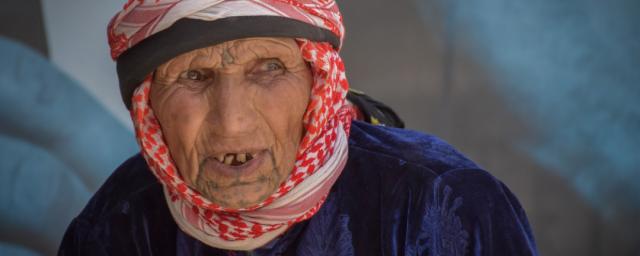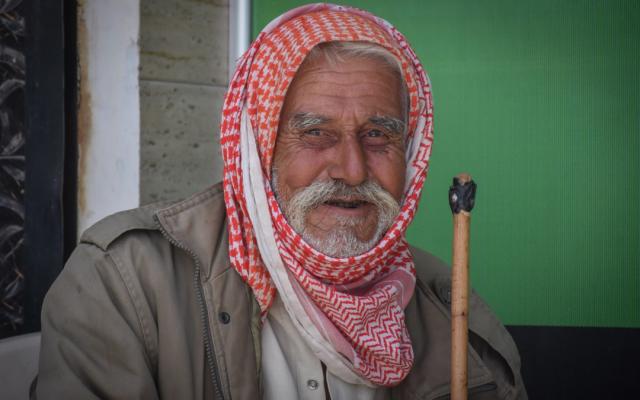
Ruqaya*, 83, lives in rural Aleppo with her family. She and 800 other families benefit from Oxfam’s cash assistance program. Photo: Islam Mardini/Oxfam
In a war-torn Syria, the coronavirus crisis is no more dangerous than any other challenge the people here have had to endure, but its economic repercussions could prove disastrous.
“I remember the long days we spent in our home; afraid the bombs would get us next. There was no way for us to go outside, to make a living or buy the food we needed. At the time, I felt as though my life were hanging by a thread; a feeling that remains with me to this day. Only now it’s not the bombs I fear, but a faceless virus that threatens to harm as well as starve my family of five and me.” Munzer*, 71, a farmer in Abou-Getheh village, in the southern countryside of Aleppo.

Munzer*, 71, is a farmer. He and 800 other families benefit from Oxfam’s cash assistance program in rural Aleppo, Syria. Photo: Islam Mardini/Oxfam
According to the latest statistics by the World Food Programme, an estimated 9.3 million people in Syria are now food insecure, up from an estimated 7.9 million people six months ago. This is almost half of the population in the country whose lives and livelihoods have been affected by the economic impact of the virus, with the most vulnerable hit the hardest.
“Prices of essential goods are at their highest since the Syria crisis began. Who would have thought that we would see the day when one kilogram of oranges would set us back 1200SYP (about 2.3USD)? This is more than what I can earn in a day”, Munzer says.
“Just when we thought things couldn’t get any worse, we are forced once again to scale down, skip meals and accumulate more debt or otherwise not survive.”
Ruqaya* (top picture), 83, also lives in rural Aleppo’s Abou-Getheh village. Her suffering is no different than that of others in her community. As prices continue to soar, she can no longer save money from selling the crops she and her family produce in order to buy seeds for the next season. “If prices continue to rise, we will have no choice but to sell a part of our land. I hope it won’t come to that, but if it does, it’s the only thing we can do,” Ruqaya tells Oxfam.
Oxfam in Syria has delivered cash assistance to nearly 800 families in rural Aleppo - each receiving 100,000SYP (approximately $200). This helps cover some of their needs and ensures they don’t have to reach out to others who may also be struggling.
Living in a double crisis
Even before coronavirus hit, four out of five Syrians lived below the poverty line. For millions, the almost decade-long war has been a time of fear, confusion and huge loss; of livelihoods and belongings, homes and family members and, for too many, the loss of dreams.
Now, the coronavirus has brought a double humanitarian crisis to Syria, bringing even greater challenges to people’s lives and pushing them into extreme survival measures.

Louay*, 45, lives with his family of six in Rural Damascus. He received 21 chickens from Oxfam. Oxfam provided another 434 families (around 2200 people) with chickens. Photo: Dania Kareh/Oxfam
“We haven’t been able to have a normal life during nine years of violence and now the coronavirus crisis is exacerbating all of the other issues we had before it came. This is too much to bear.”
Louay is a 45-year-old father of four. He lives with his family in Hamouriyeh, an agricultural town in Rural Damascus, once home to nearly 14,000 people who suffered through several years of brutal war and displacement. To cope, they’ve had to cut back on the number of meals they eat each day.
“I’ve worked as a carpenter ever since I was a boy. It was once a thriving business, but not anymore. Since the war began, and now with coronavirus, things went from bad to worse. Who would think about buying furniture now with the increased prices, when most households can't even afford their basic living expenses? People cannot afford to buy items unless they’re daily essentials. We need to forget things like meat and fruit now.”
Louay turned to farming, to help make ends meet. He owns a small plot of land and planting a part of it, hoping that he will give his family some returns by the end of the season.
Helping farmers retain their lands and livelihoods
“It was two months ago that we started to feel the impact of the coronavirus outbreak. Our income was dwindling as food prices continued to skyrocket. Everything we earned from last season’s harvest couldn’t cover my family’s basic expenses, including rent – and setting some money aside was something we could no longer do. Purchasing new seeds, the prices of which have increased dramatically, was out of the question, and so, for us, preparing for next season’s harvest was out of reach,” Marwan*, a farmer from Sakba, in Syria’s eastern Ghouta, tells Oxfam.

Marwan*, 52, lives in eastern Ghouta with his family. He and 400 other farmers have benefited from Oxfam’s seed distribution response to help them. Photo: Dania Kareh/Oxfam
Marwan, like many other hardworking Syrians, lost his house during the violence and is now staying in a rented apartment with his family. Rent is expensive, and as prices continue to rise, his livelihood and that of many others, is at stake.
To help farmers maintain their livelihoods and remain self-sufficient, Oxfam has delivered chicken, tomato and eggplant seedlings, and cucumber and zucchini seeds to around 2200 people in Eastern Ghouta. For Marwan, the seedlings and seeds have saved his family. “Without them, our only option would have been to sell some of our land to survive,” he says.
We must ensure Syrians are protected and supported
All over the country, the situation for Syrians is sharply deteriorating. Millions of Syrians like Marwan and Louay require humanitarian assistance for clean water, food, shelter, healthcare and more. For hundreds of thousands of families, it is life-saving. It is vital that families across Syria continue to receive the assistance they need.
Without access to this crucial aid, thousands more will be forced to abandon their livelihoods, bringing them closer to financial ruin. We must ensure we do everything we can to ensure Syrians are protected and supported, otherwise dignified and safe lives will fall further from their grasp.
* All names have been changes to protect identity.
Help us save lives
As the outbreak of the novel coronavirus continues, we are on the frontlines of preventing catastrophe in some of the world’s most vulnerable places, supporting our local partners and delivering much needed assistance. Your contribution can make a world of difference.